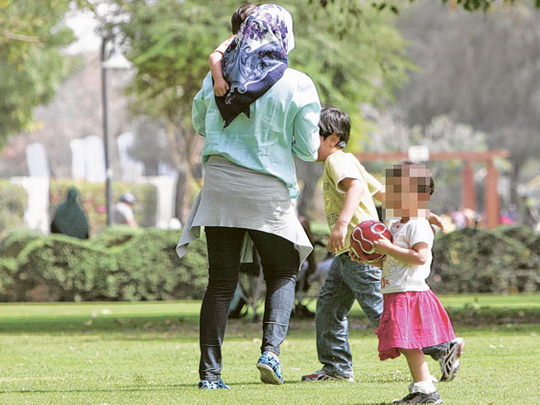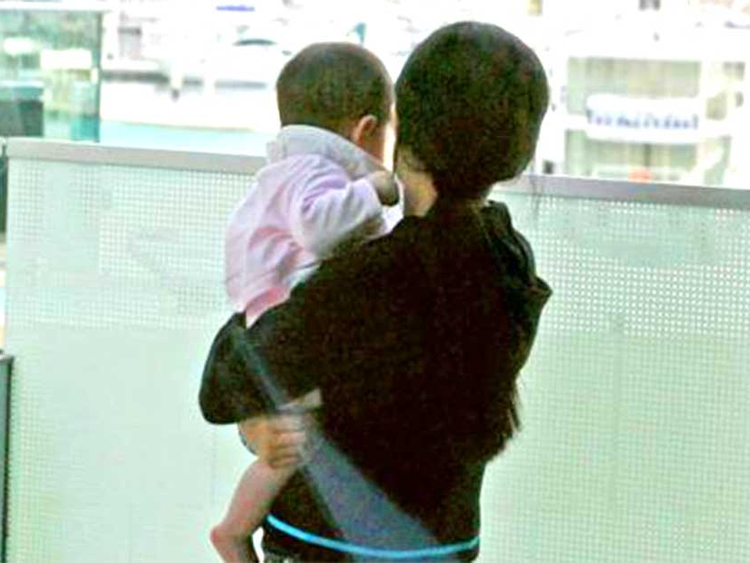
Dubai: It's 7.30am and media executive Ranjini, 25, is running late for work.
She makes a quick stop at a neighbouring apartment in Al Nahda and drops off her 11-month-old daughter after hurriedly kissing her goodbye. "You will be fine with aunty," she says, before driving off.
Elsewhere, in Bur Dubai, Janet, 31, is more relaxed. She has just woken up, but her three-year-old son is all showered and dressed. The help at home has taken care of that, just as she has with his milk and breakfast. She also packs his nursery bag and lunch box, before escorting him down the building to catch the school bus.
Welcome to a society where childcare is outsourced like nowhere else in the world.
The result: Little ones being raised by complete strangers ranging from neighbourhood babysitters to daycare providers and stay-at-home nannies.
A recent report released by the Knowledge and Human Development Authority (KHDA) is a telling comment on the state of affairs - 94 per cent of 23,851 Emirati families surveyed in Dubai keep nannies or housemaids to help in the rearing of their children and other household tasks.
The Dubai Women's Establishment which surveyed 1,186 working women in government departments of Dubai found that 62 per cent of children under four are looked after by housemaids, 32 per cent by extended families and five per cent by private nurseries.
Among expatriates, the picture is no less bleak. Of the 144,630 families surveyed in Dubai, 90 per cent send children to nurseries while five per cent keep nannies.
Parents are spoilt for choice. And it's not hard to figure out why. Besides an unaccounted number of babysitters, there are 82 private and two public nurseries in Dubai, many doubling up as pre-schools or daycare centres for children up to four years old.
Unruly children
New Zelander Carmen Benton, a teacher at a British school in Dubai, says she was so appalled to see the unruly behaviour of some students - a possible fallout of being raised by nannies - that she decided to quit her job to counsel parents.
"While it is unrealistic for parents to be spending all their time with the children, it is important to understand that if they leave their children for too long with someone else, they are co-parenting with that person," she said.
Benton, who set up Lifeworks to conduct workshops for parents, says children growing up with such co-parents are invariably confused, insecure and have low self-esteem. "They also have little discipline and independence," she noted.
The ramifications can sometimes be more even serious, says Marissa Lobo Bidappa, Clinical Psychologist at the Child Early Intervention Centre. She knows better, having dealt with a string of shocking cases: a three-year-old girl exposed to her nanny's intimate scenes with her boyfriend, another three-plus girl sexually abused by the house help and a four-year-old boy trying to jump from a window while the nanny busied herself elsewhere. "I have also had cases where nannies, wanting time for themselves give cough syrup to children to make them sleep," says Bidappa.
Even when parents are at home, overwork may leave them with limited time, attention and energy for their children, says American economist Sylvia Hewlett, warning that child neglect has become endemic to society. Hewlett links parenting deficit to a slew of problems among the youth, including poor performance in school, mental problems, drug and alcohol use and teen suicide.
As the KHDA report notes, the early years from 0-3 are critical for brain development in the spheres of socio-emotional, cognitive and language development. It is the foundation stage not only of education, but also adult well-being, physical and mental health and parents can ill afford to neglect these.
The widespread practice of outsourcing childcare to nannies has even prompted His Highness Shaikh Humaid Bin Rashid Al Nuaimi, Member of the Supreme Council and Ruler of Ajman, to warn parents against neglecting their children. WAM quoted him as saying that parents are not passing on morals and traditions to their children and are neglecting them by having them raised by nannies.
"We give far too much responsibility to complete strangers by letting them do tasks that we should be doing," says Benton, adding that such children are denied a chance to learn appropriate behaviour or boundaries from them.
For example, a nanny instructed to feed a child will do anything from running after him and stuffing his mouth to bribing or threatening him to finish his food - all of which sends wrong signals to the child. "Anorexia in later stages can be traced back to such early power struggles with food," said Benton.
A parent, on the other hand, is likely to teach the child what, when and where to eat, besides the essential ‘how'. Similarly, children growing up with nannies lag in language development as they hardly talk to them, unlike parents who keep up a constant dialogue.
In one case, the parents of a child in a Dubai school did not know she had delayed speech until her teacher told them. "The parents were both working and would leave the child with a nanny all day," the teacher said.
Executive guilt
Many parents admit to what they call "executive guilt". "But there is no choice. I have to work to supplement my husband's income," says the wife of an Indian executive, who has brought a nanny from back home to look after her daughter.
The monthly wages for nannies range from Dh700-Dh1,184, says the KHDA. Parents who sponsor nannies are responsible for their food, accommodation and medicines.
Besides sourcing nannies from their home countries, parents also hire them from local agencies. Majestic Nannies, a branch of the UK-based nanny agency, says it sends out an average of 10 nannies every month. "We source them from our local pool or specially bring them from overseas," says a source at the agency.
Part-time nannies from local agencies come for as little as Dh20-Dh40 an hour. "We supply Ethiopian and Filipina nannies at Dh35 an hour," says M. Jonathan of ARD, an agency in Al Quoz, noting they do everything from cleaning to feeding and entertaining children.
Neighbourhood babysitters too come cheap. A Sri Lankan woman residing near Al Taawun Mall says she babysits up to five children from neighbouring areas in Dubai and Sharjah five days a week. "They stay in my house from 9am to 5pm and I charge them Dh400 a month," she says.
With children spending considerable time with these co-parents, it's not surprising that some of them relate more to them than their own parents. "Our two sons would rather listen to our nanny than us as they are very attached to her," says a Filipino executive.
But thankfully, as Bidappa says, "Not all nannies are bad. It also depends on how well parents treat and train them."
Taking stock
The Bennett Report on Early Childhood and Education Services, released by the KHDA, makes a case for structured early childhood services, but cautions that they should work with families and communities.
"Their function is not to replace parents but to support them. Unless there is an emergency, it may not be advisable to place infants in childcare services from the age of two or three months for long hours," it notes, adding, "Many experts do not advise childcare for children in the first year of life." If both parents are working, parental leave policies can help secure a stable family environment for the child during the first critical year of life, it suggests.









